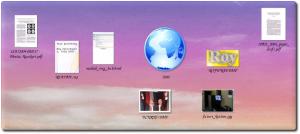
Refuse to explore and stay a monkey forever
 oogle algorithms are very complex at present. The very core of these remains PageRank — a mechanism that often gets misused and leads to disasters (referrer spam among other link spamming techniques). For my recent zombie attacks I blame:
oogle algorithms are very complex at present. The very core of these remains PageRank — a mechanism that often gets misused and leads to disasters (referrer spam among other link spamming techniques). For my recent zombie attacks I blame:
- Google – for unintentionally leading to ‘link greed’, not understanding or anticipating streetsmarts and penetration of second- and third-world countries into the Internet
- ISP‘s – for apathetically harbouring traffic that is pure spam or targetted attacks
- Microsoft – for creating an operating system that is so easy for crooks to capture
Google’s algorithms have become like a horse that has lots of decorations upon it, but is nothing more than a brute-force horse underneath. You can take a pig, put it in a dress and take it out for dinner. But it’s still a pig in dress, not a girlfriend.
Search must Evolve. A flawed or limited principle at the heart of something is bound to fail no matter how many bits you hang atop to patch it up and improve it. This is why traditional page indexing is not a good method for approaching the problem of information extraction and discovery. Microsoft’s operating system, for instance, suffers from the very same problem where a flawed and too complex an operating system was build from ‘code spaghetti’. It was recently heard through the grapevine that Longhorn was thrown away and reverted merely to ground zero to be based on the XP-related Server 2003 code. This comes to show that weekly updates were merely patching a mordid mess. Microsoft recognise their inability to complete with Linux performance (uptime, flexibility — the a reason for Monad). Linux just took a right approach — a right paradigm if you like — all along and was therefore able to sweep along all the best programmers in the world.
Returning to Google, by relying heavily on PageRank and making ad-hoc improvements, no real innovation will be made. This is why I intimated Iuron a few days ago. It ought to turn a large pool of indexed page into actual knowledge and provide definitely answers rather than a linear scatter of related pages.
Also comes to mind are AltaVista and other antiquated search engines with very fundamental and not-so-cunning methods for scanning pages. These were very quickly relaced by backlink-based engines, i.e. link counting in 1998. No progress has been made in nearly 8 years, however. One may begin to conceive a Google killer rather than a Windows killer. The required resources, however, in particular data centres, make the (financial) entry barrier too high to initiate a substantial enough threat. Proprietaries, however, are no concrete barrier, in contrary to the case with operating systems. So, I remain optimistic and I might soon meet some professors whose expertise is the semantic Web.
With reference to the famous 3-monkey image on top (I also have one on top of my monitor), those who refuse to evolve (Ballmer) show ‘zoo symptoms’ already. I vividly recall the day when Scoble quoted Microsoft CEO, Steve Ballmer, saying that RSS has no future. This was roughly 7 months ago. Ballmer also said that Google would vanish in 5 years and promised that MSN search was bound to ‘kill’ Google. I say: live in the past, be the past.
Moving on to a different topic, the latest article with the theme of aging at Microsoft came out on the day when I first composed this item: Pity poor Microsoft’s midlife crisis. Another recent article I have just been informed of is At 30, Microsoft Grapples With Growing Up.
Recommended reading:
Q: What about all the people in the corporate environments who are forced to use MS products and aren’t allowed the option/choice to use Mac/Linux/UNIX?
A: Kick your boss’s ass, or, choose to work for a company who have decisions that you liked.






 Filed under:
Filed under: 
 The item, by the way, was written by Google’s Code Manager, with whom I raised my concerns over Linux negligence in the past. This item proves that Google have truer intentions of giving back to the very same
The item, by the way, was written by Google’s Code Manager, with whom I raised my concerns over Linux negligence in the past. This item proves that Google have truer intentions of giving back to the very same  INDOWS Vista was already said to be a trainwreck, primarily due to its inability to deliver something innovative. It gives no compelling reason whatsoever for users to upgrade. People who have had the chance to fiddle with the Vista beta build can confirm this. In fact, it seems to be lagging behind other operating systems, notably Mac OS X as was previously
INDOWS Vista was already said to be a trainwreck, primarily due to its inability to deliver something innovative. It gives no compelling reason whatsoever for users to upgrade. People who have had the chance to fiddle with the Vista beta build can confirm this. In fact, it seems to be lagging behind other operating systems, notably Mac OS X as was previously 
 OHN H. Terpstra, a bold IT consultant, explains in an excellent article, which comes in 3 parts, how Microsoft and its disguised allies are
OHN H. Terpstra, a bold IT consultant, explains in an excellent article, which comes in 3 parts, how Microsoft and its disguised allies are 
 ERTAIN issues arise when habits and user orientation in his/her desktop are interfered with. Desktop environments, installers, filesystem structures, or even platforms in general are often more workable and thus successful if they comply with the expectation of new users. What if these are made too stringent by the developers, however? What if decisions and conventions are voted for without involvement of the end-user?
ERTAIN issues arise when habits and user orientation in his/her desktop are interfered with. Desktop environments, installers, filesystem structures, or even platforms in general are often more workable and thus successful if they comply with the expectation of new users. What if these are made too stringent by the developers, however? What if decisions and conventions are voted for without involvement of the end-user? F Windows is ever to be used, it should be standards-compliant and perhaps, just perhaps,
F Windows is ever to be used, it should be standards-compliant and perhaps, just perhaps,  That site is an invaluable resource by all means. 5 years down the line when dual-boot no longer is a necessity to most, we will still be able to recall the days when a different operating system prevailed in this world. Since it’s Web-based, no bytes will be consumed on local storage either.
That site is an invaluable resource by all means. 5 years down the line when dual-boot no longer is a necessity to most, we will still be able to recall the days when a different operating system prevailed in this world. Since it’s Web-based, no bytes will be consumed on local storage either.
 oogle algorithms are very complex at present. The very core of these remains PageRank — a mechanism that often gets misused and
oogle algorithms are very complex at present. The very core of these remains PageRank — a mechanism that often gets misused and